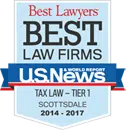IRS Announced Revisions & Updates To Voluntary Disclosure Practice Preclearance Request & Application Form
Earlier this month, the Internal Revenue Service announced that they had revised and updated Form 14457, Voluntary Disclosure Practice Preclearance Request and Application, along with its accompanying instructions. These revisions provide clarification on several issues that caused frequent confusion during the form submission process and have been well received by many tax professionals.

The Basics Of Form 14457, Voluntary Disclosure Program
The Voluntary Disclosure Program (VDP) gives non-compliant taxpayers an opportunity to file missing or amended returns that correct inaccurate tax returns from the previous year and pay owed taxes. Taxpayers who were at risk of criminal prosecution for intentionally violating tax law can avoid legal proceedings with the IRS by disclosing information that they had previously chosen not to disclose.
Essentially, the Voluntary Disclosure Program provides non-compliant taxpayers a type of amnesty as long as they can meet all of the eligibility requirements: their disclosure must be truthful, timely, and complete. The IRS requires strict adherence to all of these requirements. If the taxpayer does not comply, their VDP may be considered invalid and the taxpayer will still be at risk of criminal prosecution and tax penalties. Therefore, attention to detail is crucial if a non-compliant taxpayer wants to use a VDP to make a successful disclosure, pay their owed taxes, and avoid IRS prosecution.
The taxpayer submitting a VDP must cooperate with the IRS to determine the correct amount of delinquent taxes, interest, and penalties. They will also need to make a full payment or propose a detailed repayment plan.
Revisions & Updates To The VDP Form
A number of helpful updates and additions have been made to Form 14557, including:
Taxpayer signatures: The criminal investigation branch of the IRS will now accept photocopies, facsimiles, and scans of taxpayer signatures. These can now be sent via fax if desired; previously, they could only be mailed, which increased processing time of the VDP and created difficulty for taxpayers when the deadline could not be met.
Virtual currency: This has been a hot topic for the IRS of late, as suspicions have increased that many taxpayers are failing to report all income associated with their virtual currency holdings with the false assumption that the IRS will be unable to identify these holdings. The updated version of the VDP provides an expanded section dedicated to virtual currency, enabling taxpayers to more easily report their prior non-compliance so they can avoid prosecution as the IRS bears down on virtual currency activity.
Specific tax penalties: An updated penalty structure for employment tax, estate, and gift penalties is incorporated into the updated VDP.
Incomplete payment: The updated form includes a checkbox for taxpayers to indicate that they cannot pay in full. If this is the case, the taxpayer must satisfactorily prove with documented evidence that they lack the ability to make a complete payment, and submit a proposed plan for repayment. All income and assets, both foreign and domestic, will need to be disclosed if the taxpayer attempts to prove that they cannot make an immediate and complete payment.
VDP Provides a Solution For Non-Compliant Taxpayers
The updated form reflects trends in the financial assets held by today’s taxpayers, such as virtual currency. IRS officials hope that the updated form will encourage more non-compliant taxpayers to step forward and address their deficient tax situations before the IRS takes legal action against them.
Since its inception, thousands of taxpayers who would otherwise be at risk of criminal prosecution have taken advantage of the VDP and come into compliance. However, taxpayers who choose to submit a VDP are still subject to civil examination and must pay all applicable taxes, together with penalties and interest.
Taxpayers who have not committed tax crimes and simply need to make corrections or file delinquent returns usually should not complete a Voluntary Disclosure Program form, but instead should consult with their tax attorney to determine the best approach for their situation.
Arizona’s Most Experienced Tax Attorney Firm: Silver Law PLC
With more than 100 combined years of experience, the tax attorneys at Silver Law PLC are ready to aggressively represent you in any tax-related legal proceedings. Whether you need representation against the IRS, innocent spouse relief, or white collar criminal defense, we are prepared to protect your rights. Contact our office today to schedule your confidential, private consultation.

Email: lchapman@silverlawplc.com
Website: taxcontroversy.com
Arizona Location
7033 E. Greenway Pkwy, Ste 200
Scottsdale, AZ 85254
Office:(480) 429-3360
Henderson Location
410 South Rampart Blvd, Suite 390
Las Vegas, Nevada 89145
Office: (702) 801-1000
Las Vegas Location
410 South Rampart Blvd, Suite
390 Las Vegas, Nevada 89145
Office: (702) 726-6819
San Diego Location
7676 Hazard Center Drive, Suite
1525 San Diego, CA 92108
Office: (619) 387-3790
Coronado Location
724 1st St.
Coronado, CA 92118
Office: (619) 612-5337
Utah Location
11576 S. State Street, Suite 1002
Draper, Utah 84020
Office: (801) 340-7514
















Leave a Reply
You must be logged in to post a comment.